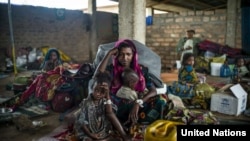The UN refugee agency said it needs three times as much money as it's already received to provide basic aid to the hundreds of thousands of refugees from the Central African Republic (C.A.R.).
In an effort to revive international support, UNHCR held a donors’ meeting Tuesday in Geneva. The agency said that so far, it has received about one-third of what it needs this year to carry out its humanitarian operations in Cameroon, Chad, the Democratic Republic of Congo and the Republic of Congo.
UNHCR said 357,000 C.A.R. refugees have fled to neighboring countries since fighting erupted between Seleka rebels and the government in December 2012. An additional 160,000 have fled since last December after clashes intensified between the Seleka Muslim alliance and Christian anti-Balaka militia, according to UNHCR.
The agency said the majority of those who left C.A.R. are Muslim women and children.
UNHCR spokesman Babar Baloch told VOA refugees continue to flee the Central African Republic at a rate of about 2,000 a week. He said most of them head for Cameroon, with over 118,000 seeking refuge there in the last seven months.
“People that we have been receiving inside Cameroon, they have been walking for days, weeks and months,” said Baloch. “When they arrive many of these are going through phases of malnutrition, but especially kids. When they arrive, they come to die at our doorsteps and that is a very dire situation.”
Baloch said interest in the C.A.R. refugees has dropped significantly since images of their desperate plight have disappeared from television screens. He called it a forgotten crisis and said that is having severe repercussions.
“It seriously hampers our efforts,” he said. “People who arrive in the neighboring countries need to be taken care and brought into refugee sites or camps. That is not there. Many of these people are just in the bordering areas here and there, where access is hard in terms of reaching them, but also in terms of caring for them [and providing] food, water, sanitation, and medical health assistance.”
Baloch said greater efforts must be made to relocate people away from insecure and remote locations that often are hard to reach. He says more sites need to be established to ensure refugee safety.










